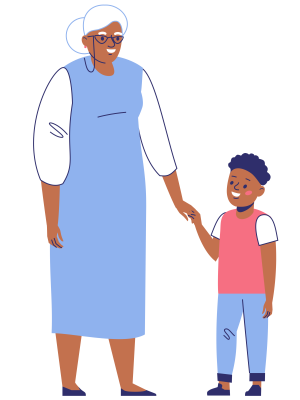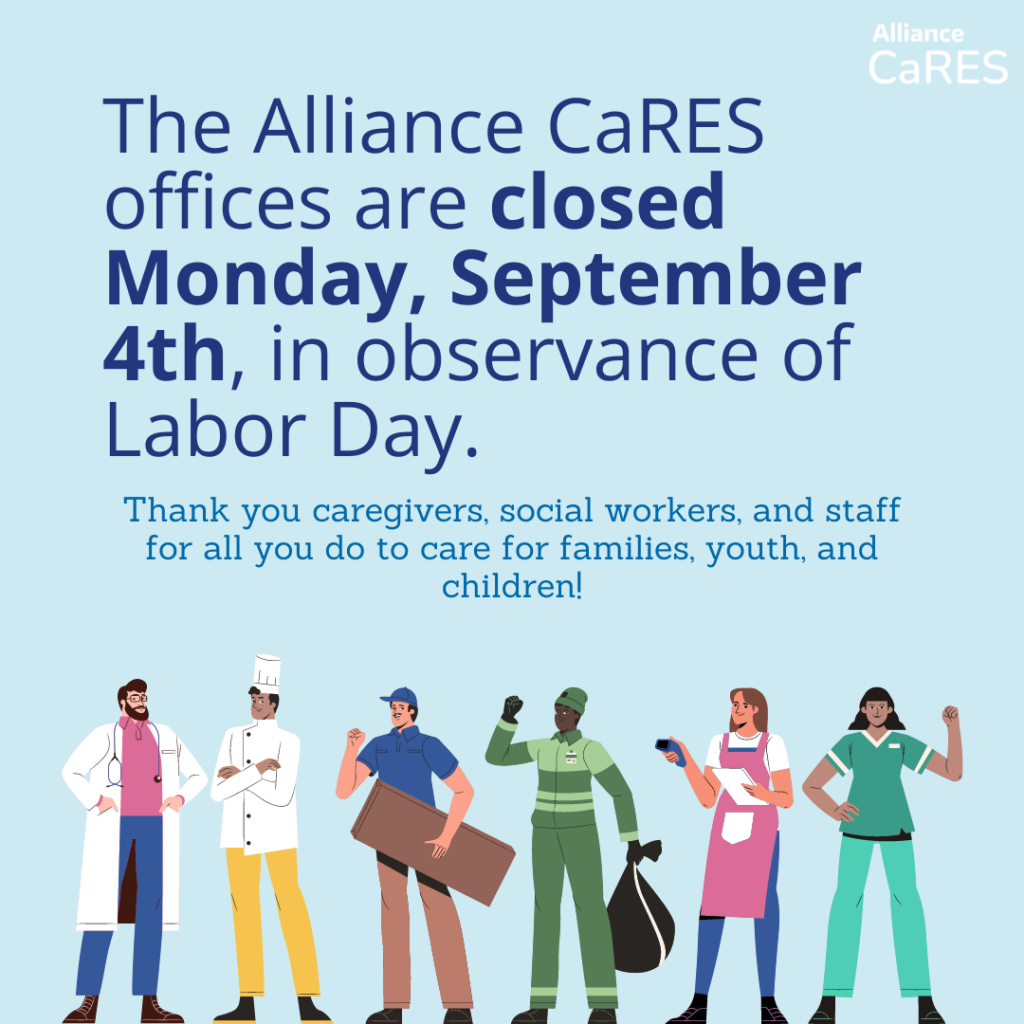Kinship Caregivers
We're here to support your unique situation
Are you raising a child of a family member or a family friend? Your circumstance means you have joined the community in a unique way. As a kinship caregiver, you are dealing with special dynamics, and navigating through the system in a specific way. You’re looking for family-focused resources, and we are here to help.
The Alliance CaRES Program is a partner of the Department of Children, Youth, and Families offering support to caregivers around the state. Our local Mentors are dedicated to working alongside caregivers at every stage of your journey, providing guidance, access to resources, and support groups on specific topics where you can learn and interact with peers. If you are interested in learning more about becoming licensed, click here.
We also offer robust learning opportunities through The Alliance for Professional Development, Training, and Caregiver Excellence such as trainings and individual support sessions. We are here to answer your questions and offer help when you need it! We can help you find resources, problem-solve, connect you locally, and offer advice in special areas including Kinship care, caring for LGBTQ+ youth, caring for medically complex youth, and more. Please reach out!
To learn more about what the Alliance CaRES program can offer you and to get to know our team, view this video.
More than half the children placed in out-of-home care by the Department of Children, Youth, and Families (DCYF) are placed with a relative or person known to the child and/or family. The financial, legal, and emotional issues of raising a relative’s child can be challenging.
We are here to help assist and provide resources for:
· Unlicensed care of a relative placement
· Foster licensing to care for a relative placement
· Guardianship
· R-Gap
· Adoption
Becoming a licensed foster parent can feel overwhelming. Just take it one step at a time. Keep the “Journey Towards Licensure: Kinship” Checklist handy to track your progress or reference as you’re moving forward! You can check things off in whichever order works for you.
In addition to the Resource Library listed below, you may need more individualized support. Please feel free to contact our Kinship Coordinator Luanne Marshall by email at lmarsh3@uw.edu or call 206-221-4913.
Please fill out this form for more information on fostering and a member of the CaRES team will contact you with an email and phone call introducing you to our program and to see how we may help support you.
Specialized Events
 Kinship Special Event: Managing Holiday Stress Within a Shifted Family Structure
Kinship Special Event: Managing Holiday Stress Within a Shifted Family Structure
Wednesday, December 6 from 6:30 – 8:30 p.m.
Relationships during the Holidays can be complicated under the best of circumstances. Add to that a shift in family dynamics, different roles, expectations and the tension that can bring to the Holiday Festivities and it can get challenging. Join us in this discussion group as we talk about challenges of celebrating as a family raising kin. Learn new strategies and resources to help get you through the Holidays.
Register Here: CaRES Special Events: Kinship Caregivers | UW School of Social Work Professional Education
Specialized Support
It’s All Relative: Kinship Support.
Drop by for kinship resources, help with licensing, and answers to your kinship questions.
First Thursday of every month from 7-8 p.m. Click here to join the Zoom session.
Email Licensing and Kinship Coordinator Luanne Marshall at lmarsh3@uw.edu to schedule a Lunch with Luanne for personal support with kinship or general foster licensing.
Resource Library
Child-only TANF (Temporary Assistance for Needy Families). This type of TANF is not based on income and kinship caregivers are eligible in most instances. You can apply for TANF online.
How to Apply for Child-Only TANF Our partners at the Department of Social and Health Services developed this video to walk you through how to complete a TANF application.
Kinship Core Training (KCT) KCT is designed to help kinship caregivers develop the skills they need to care for children who have experienced complex trauma. KCT is intended to meet the training requirements for those kinship caregivers pursuing licensing.
Becoming a licensed foster parent can feel overwhelming. Just take it one step at a time. Keep the “Journey Towards Licensure: Kinship” Checklist handy to track your progress or reference as you’re moving forward! You can check things off in whichever order works for you.
Most of these are available to foster and kinship families, some require proof of caregiver status, usually in the form of a foster care license. This is noted whenever we are aware of it. The Alliance CaRES program does not support or endorse any of the listed items; they are compiled for your convenience. We make every effort to keep these up-to-date, if you know of a correction or an item not listed, please let us know by emailing notifycares@uw.edu
Check out our resource page for places in your area that offer discounts or free opportunities or items to families in the care system.
DCYF Foster Parenting and Kinship Support Newsletter: Subscribe to DCYF’s email service and receive the Caregiver Connection Newsletter and other emails with important information.
Alliance Caregiver Training emails: Sign up to receive emails for upcoming Caregiver trainings in your area
We send both region-specific messages and also statewide messages that apply to all regions.
Commonly Used Acronyms A guide to help you understand commonly used acronyms in Children’s Services.
The Child Welfare Team A guide to the different roles of people associated with a child welfare case.
DCYF provides answers to Foster Parent and Kinship Caregiver frequently asked questions.
Focusing on your physical, mental and financial health is critical if you are your grandchild’s primary caregiver. Find resources for legal, health, financial and other needs in this article from RetireGuide.
The resource guide covers multiple services and resources available to kinship caregivers.
There are a variety of legal issues that many relatives raising children face. To help provide information, chick the link for DSHS resource list.
This chart is designed to help kinship foster parents compare adoption and guardianship as two options that you and the children in your care can pursue to exit foster care and create permanent families.


